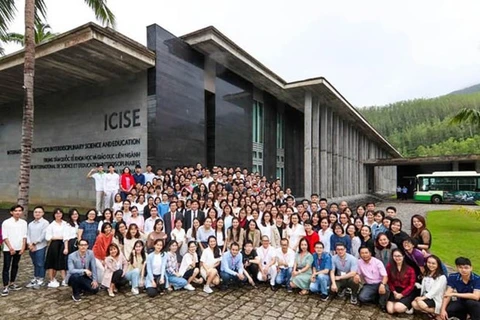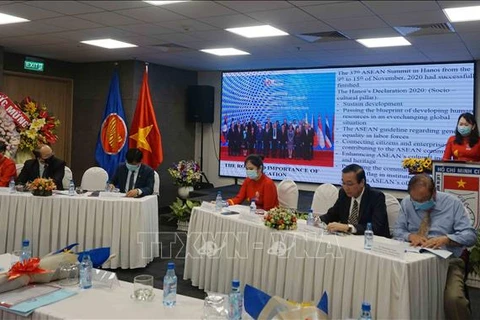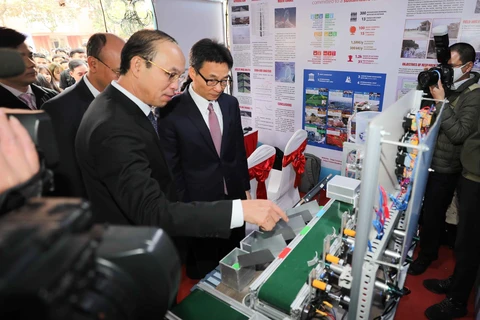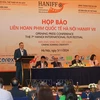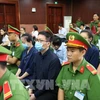 High school students in HCM City learn about new majors offered at universities at an Enrollment Day event in 2019. (Photo: VNS)
High school students in HCM City learn about new majors offered at universities at an Enrollment Day event in 2019. (Photo: VNS) HCM City (VNS/VNA) - A number of universities in the country will launch new majors for the 2021-2022 academic year to meet labour market demand.
The amended Education Law gives universities the right to make independent decisions on opening new academic majors.
Pham Thai Son, director of the Communications and Enrollment Centre at the HCM City University of Food Industry, said “The university will have six new majors this year, including food business management, fashion and textile business, marketing, thermal engineering and technology, energy management, and analytical chemistry engineering.”
“Students in the food business management major will study business administration and food technology,” Son said.
Open University in HCM City plans to have seven new majors, including public management, food technologies, Korean studies, economics, computer science, Chinese studies, and Japanese studies, increasing its total number of majors to 38, including 11 majors called "high-quality".
Hong Bang International University in HCM City plans to offer new majors in real estate, biomedical engineering, medical biotechnology, psychology, event management, public relations and education management, raising its total number of majors to 68 in the 2021-2022 year.
Moreover, the university will offer eight more majors jointly with the University of Arizona in the US and Bedfordshire University in the UK.
The HCM City University of Economics and Finance plans to enroll students in five new majors, including real estate, international finance, journalism, psychology, and graphic design this year.
The HCM City University of Technology's new majors this year will include robotics and AI, data science, human resource management, and international relations.
Da Lat University plans to enroll students in seven new majors, medicinal chemistry, food technology, environmental engineering technology, statistics and data science, population and development, tourism culture, and automation and control technology.
A number of private universities this year plan to enroll students in new majors related to the health sector.
Hong Bang International University, for instance, will offer eight more majors, including traditional medicine, medical imaging engineering, oral health, midwives, nutrition, children’s diseases care, therapeutic activities, and hospital management.
HCM City University of Technology will offer majors in medical testing engineering and nursing.
Hoa Sen University will have four new majors in this sector, including dentistry, pharmacy, biomedical engineering, and hospital management.
Van Lang University will enroll students in two new majors, medicine and traditional medicine, raising the total number of majors in the health sector to six.
However, Ngo Minh Xuan, rector of Pham Ngoc Thach University of Medicine, told Tuoi Tre newspaper that the rising number of majors was concerning. If the training process is not up to standards, quality will not be ensured.
For the medical profession, teaching and studying in hospitals is very important because it improves students' skills in real-life settings, according to Xuan.
Besides having access to sufficient facilities for training, university lecturers also must have experience in coordinating with doctors at hospitals.
Nguyen Ngoc Khoi, head of the training affairs department at the HCM City University of Medicine and Pharmacy, said that students would have more options if many universities provide majors in the health sector. However, the universities must maintain quality assurance conditions during training.
Many of them would not be able to ensure quality if their enrollment exceeds their quota and students do not have sufficient facilities for practice, Khoi said.
According to Xuan, the Ministry of Health will co-operate with the Ministry of Education and Training in inspecting these universities in the upcoming time.
Pham Van Tac, director of the Department of Science, Technology and Training under the Ministry of Health, said the department this month would identify the new number of healthcare majors at universities and their training capacities.
The review would be carried out under Prime Minister Nguyen Xuan Phuc’s requirement. At a Health Work Conference recently held in Hanoi, the Prime Minister said that admission into the medical and pharmaceutical industry must be strictly controlled.
Universities offering these majors must meet standards, Tac said.
Xuan said the Ministry of Health was collecting ideas for a draft on examinations for practitioner certificates for medical graduates. This would assess the quality of training and the practitioners eligible to meet standards in medical examination and treatment.
Xuan said a solution to supervise the quality of training should be carried out. The country should devise a plan for medical schools to ensure quality of resources and avoid a job redundancy crisis that once occurred in the education sector.
During a meeting with presidents of councils and rectors of medical and pharmaceutical universities in September 2020, Minister of Health Nguyen Thanh Long said the examination for the practitioner certificate would improve quality.
It would be conducted soon after the amended Law on Examination and Treatment takes effect.
In the first stage, the exam might be of a moderate difficulty, but the next stage would be more difficult and would be at the same level as similar exams in developed countries, Long said./.
VNA
